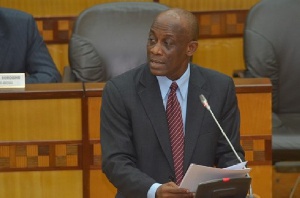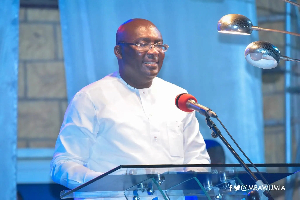Finance Minister Seth Terkper in his presentation of the 2015 Budget Statement to Parliament on Wednesday, predicted that Ghana’s economy will continued to grow at respectable rates, led by the agriculture sector.
He said the completion of Ghana’s own gas pipelines and processing plant to utilise the free 200 billion cubic feet of gas from the Jubilee field, as well as the future coming on stream of additional gas and crude oil production and supplies from the Sankofa and Tweneboa-Enyenra-Ntomme (TEN) fields, all provided prospects for a further boost to the nation’s economy from the energy sector.
“This has become even more promising with the signing of the Millennium Challenge Corporation (MCC) Compact II Agreement with the United States of America (USA)”, he added.
According to Mr Terkper, the 2015 Budget was unique in the sense that it will usher the country into the gas era and the Phase II of oil and gas production.
He stated, however, that notwithstanding the economic successes it had chalked, the Government’s resolve at rebalancing the Budget was severely tested again when the economy came under additional significant shocks in 2013, many of which continued into the 2014 fiscal year.
The challenges include the continued disruption in the supply of gas from the West African Gas Power Pool (WAGP) from August 2012 through August 2014, due to the damage caused to the pipeline, Mr Terkper said, adding that this had inflicted significant adverse effects on power supply, national output, foreign exchange reserves, and tax revenues.
“The fall in gold and cocoa prices has had similar effects and, required sacrifices by our hardworking cocoa farmers as well as Government in the form of curtailed producer price and export duty respectively. Hence, we have reason to commend our farmers and return the favour with the producer price increase that we announced this year”, he stated.
There was, also, the sluggish inflow of grants from some Development Partners for the third year in succession which constituted about 75 per cent below what was pledged to support the budget.
“While the slump in petroleum prices during the third quarter of 2014 has benefitted our automatic adjustment policy, it is also a factor that becomes important in our quest to utilize the petroleum funds under the PRMA for savings, stabilization and investment.”
The Finance Minister said it was at this critical juncture that the Government decided to request the IMF for Balance of Payments support that only comes from a funded IMF Programme.
“Indeed, the enhancements to the Home Grown Policies which would have expired in 2016/17 and outcome of the Senchi consultations have been used as a vital input for the on-going Programme discussions with the IMF”, he added.
He indicated that the discussions had been progressing well, and that when time was ripe for the IMF Board to approve the Programme, the Government would give Parliament an update.
On the Ebola threat in West Africa, Mr Terkper said it posed a significant risk to the region’s growth prospects, particularly its effects on the tourism and the hospitality sub-sectors.
“It is instructive to note that, His Excellency, President John Dramani Mahama, in his capacity as the Chairman of Economic Community of West African States (ECOWAS), has been at the forefront of the humanitarian efforts to mobilise both financial and material resources to bring the epidemic under control”.
He noted that Ghana had been designated as the UN centre for coordinating global response to the Ebola crisis owing to the sterling leadership of President Mahama, and indicated that Government was implementing several safety measures to protect the citizenry from the virus.
Click to view details



Business News of Thursday, 20 November 2014
Source: GNA

















